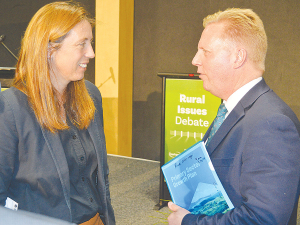Green no more?
OPINION: Your old mate has long dismissed the Greens as wooden bicycle enthusiasts with their heads in the clouds, but it looks like the ‘new Greens’ may actually be hard-nosed pragmatists when it comes to following voters.
 Beef+Lamb chair Kate Acland talks with National’s Todd McClay following the Rural Issues debate at Mystery Creek earlier this month.
Beef+Lamb chair Kate Acland talks with National’s Todd McClay following the Rural Issues debate at Mystery Creek earlier this month.
Climate change, record low farmer confidence and an avalanche of government-sponsored regulations dominated the inaugural Rural Issues Debate in Hamilton earlier this month.
About 300 industry leaders and farmers turned up at Mystery Creek to hear five major parties thrash out their policies for the rural sector. About 35,000 people tuned in for the livestream, according to Beef+Lamb NZ.
Agriculture Minister Damien O'Connor, National's agriculture spokesman Todd McClay, former Federated Farmers president and ACT candidate, Andrew Hoggard, retiring Green MP Eugenie Sage and NZ First candidate Mark Patterson lined up for the 90-minute talk fest.
While O'Connor spent most of the time defending his Government's emission target and new regulations for farmers around water and the environment, McClay was at ease parroting his party's policies he says will make farming less stressful and cumbersome. He reiterated National's pledge to review methane targets based on global warming and got a round of applause.
The debate was jointly organised by B+LNZ, Feds and DairyNZ. B+LNZ chair Kate Acland told Rural News that she was thrilled with the response to the debate.
"Approximately 35,000 tuned in to the livestream on the night and there has been plenty of discussion about the debate and the issues raised," Acland says.
"It was a robust debate on the night and the exchanges between the candidates certainly didn't disappoint those in the audience and watching."
Acland says B+LNZ was pleased to see the commitment from National's Todd McClay to a review of the methane targets and to look at measuring and report emissions based on warming impact.
"This was timely as it follows the release of the groundbreaking methane report by B+LNZ, Federated Farmers and DairyNZ," she explained.
"This showed the current reduction targets could see methane offset all of the expected additional warming from carbon dioxide and nitrous oxide from the entire New Zealand economy."
Feds national president Wayne Langford noted that all the significant political parties recognised the importance of the rural vote.
"None of the speakers held back in their views and the crowd took it very seriously, due to the state of the primary sector at the moment."
Langford says he thought all the speakers raised good points and represented their parties well.
Debate convener and journalist Heather du Plessis-Allan started by going through Feds' latest farmer confidence survey. She asked O'Connor if he knew the Government was to blame for the high level of input prices and the record low level of confidence in the farming sector. The Labour MP didn't take the question well.
"If you take this one-eyed view then there won't be helpful discussions tonight," he said. "If you hadn't been awake, you wouldn't have noticed Covid put a bit of pressure on the way we run farms and the Ukraine war has caused high inflation."
O'Connor noted that since Labour got into government, all farmer confidence surveys have produced a negative result despite a $9/kgMS milk payout and $12/kg price for lamb in recent years.
“Farmers always react negatively to some of the things that need to be carried through: no one likes change, I absolutely get it.
“But don’t blame us because international commodity prices take a turn, and for our huge reliance on China.”
McClay agreed with O’Connor and said that the minister could do nothing about prices farmers receive.
But he added that the Government is responsible for the extra costs imposed on the farming sector through its many rules and regulations. McClay says National aims to put trust back into farmers.
“They care about the land and they want to do well, but don’t force rules them that incur extra costs,” he told the audience.
Hoggard says ACT had a range of policies around farming and he hopes some of them would be adapted in any governing agreement with National.
“The outcome of our policies is to make farmers enjoy farming again.”
Patterson questioned why Climate Change Minister James Shaw had opted out of the debate and instead attended a finance debate in Queenstown.
“He should have been here, discussing how money is made and not how it is spent.”
Sage defended Shaw, saying it was the season for political debates and “we can’t be everywhere”.
Former Fonterra executive Alex Turnbull has been appointed CEO to lead all five Yili Oceania Business Division companies in New Zealand.
Fonterra executive René Dedoncker is leaving the co-operative later this year to lead Australian agribusiness Elders.
Alliance Group and the Southland Stags rugby team have joined forces in a partnership that will see the the meat co-operative's farmgate brand feature on players' team kits and replica jerseys.
Fonterra's plan to expand its organic programme to the South Island is being well received by farmers, the co-op says.
Voting has started for the renewal of DairyNZ's milksolids levy.
The most successful catchment groups in NZ are those that have 'a source to sea' approach.

OPINION: Here w go: the election date is set for November 7 and the politicians are out of the gate…
OPINION: ECan data was released a few days ago showing Canterbury farmers have made “giant strides on environmental performance”.